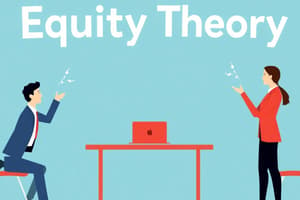Podcast
Questions and Answers
What term describes the belief that effort will lead to a certain level of performance?
What term describes the belief that effort will lead to a certain level of performance?
- Expectancy (correct)
- Reward
- Instrumentality
- Motivation
Instrumentality is the confidence that employees will receive their desired rewards.
Instrumentality is the confidence that employees will receive their desired rewards.
True (A)
What three conditions must be present for employees to be motivated according to Vroom?
What three conditions must be present for employees to be motivated according to Vroom?
Expectancy, instrumentality, and valued rewards
If either expectancy or instrumentality is missing, employees will lack __________ to perform well.
If either expectancy or instrumentality is missing, employees will lack __________ to perform well.
Match the following concepts with their descriptions:
Match the following concepts with their descriptions:
Which of the following statements best summarizes Vroom's expectancy theory?
Which of the following statements best summarizes Vroom's expectancy theory?
According to Vroom's expectancy theory, the strength of desire to satisfy a need plays no role in determining work effort.
According to Vroom's expectancy theory, the strength of desire to satisfy a need plays no role in determining work effort.
What are the three beliefs on which Vroom's expectancy theory is based?
What are the three beliefs on which Vroom's expectancy theory is based?
In Vroom's expectancy theory, __________ is the depth of an employee's desire for an extrinsic or intrinsic reward.
In Vroom's expectancy theory, __________ is the depth of an employee's desire for an extrinsic or intrinsic reward.
Match the components of Vroom's expectancy theory with their descriptions:
Match the components of Vroom's expectancy theory with their descriptions:
Flashcards are hidden until you start studying
Study Notes
Victor Vroom and Expectancy Theory
- Victor Vroom suggested that individuals choose behaviors they believe will lead to valued results.
- Expectancy Theory: Individuals are motivated if they believe:
- There is a positive link between effort and performance.
- Favorable performance will result in a desirable reward.
- The reward will satisfy an important need.
- The desire to satisfy the need is strong enough to make the work effort worthwhile.
Three Core Beliefs
- Valence: The strength of an employee's desire for an extrinsic reward (e.g., money) or an intrinsic reward (e.g., satisfaction).
- Expectancy: Individuals believe putting effort into work will lead to a given level of performance.
- Instrumentality: Employees are confident they will receive what they desire if they perform well.
Conclusion
- Vroom argued that if any of the three beliefs are missing, workers will lack motivation to perform well.
- Managers should aim to ensure employees believe increased effort leads to improved performance, and that this performance will lead to valued rewards.
Studying That Suits You
Use AI to generate personalized quizzes and flashcards to suit your learning preferences.




